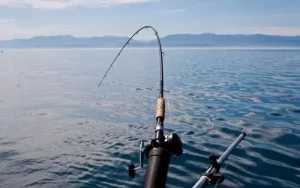Many people love fishing. It’s relaxing and fulfilling when your bucket is full of fish. The interesting thing is that the dishes will be much better.
However, fishing can be dangerous if you get conductive materials for fishing lines. Especially under the condition of water, rain, or lightning, your life is threatened.
It’s a common understanding why fishermen are worried and keep a question in their minds: Is fishing line conductive? Let’s find out the answer.

Contents
- Is Fishing Line Conductive?
- Can Electricity Go Through Nylon?
- Is Fishing Wire Flammable?
- Fishing Rope: Is It Strong?
- Are Carbon Fiber Fishing Rods Electrically Conductivity?
- Can A Graphite Rod Conduct Electricity?
- Fishing Lines: Do They Harm Fish?
- Which Fish Can Make Electricity?
- Fish Tapes For User
- In Conclusion
Is Fishing Line Conductive?
Yes and no. There are three types of fishing lines: monofilament, fluorocarbon, and braid. The final one is conductive. Other types are not. People may blame it on the materials; however, it’s a fun fact that no components in the fishing line can transfer the volt.
To protect the customers, fishing companies will avoid conductive components in their products and apply safer ones, including Nylon, polyvinylidene fluoride, high-density polyethylene, polypropylene, spectra, Dyneema, and dacron.
So, why do fishing lines still have the ability to conduct it?
There are two main reasons for fishing lines to conduct electricity. First, there is a steel core inside the lines to strengthen them. It happens to braided products. Then, it’s due to the product quality. The purity of materials or bad conditions after usage can reduce the electricity-proof of fishing lines.
If you find any advertisement about “non-conductive fishing lines,” be aware and check it carefully before making a purchase.

Can Electricity Go Through Nylon?
Absolutely no. Chemically, Nylon belongs to polyamides with no free electrons to conduct electricity. However, it still happens under certain circumstances to hazard us with danger.
Scientists proved it in the early 1970s thanks to a mistake when producing Nylon without a catalyst. Another way to improve the conductivity of Nylon is to add iodine.
Although it does happen for Nylon to transmit electricity, it is still non-conductive in normal conditions.
Nylon is favorable in fishing line productions thanks to its electric isolation ability.
Is Fishing Wire Flammable?
Yes, it is burnable. Fishing lines are not designed to withstand high heat. Depending on the material of the fishing rods made, they will melt and burns at different temperatures.
However, you can decrease the memory of fishing lines by heat. Many anglers choose to boil or put it in the oven, but both ways will damage them. At worst, the high heat will melt the lines, especially the mono-filament.
The correct way is to soak the fishing wire in warm water and let it cool down naturally. It takes longer but is safer and more effective.

Fishing Rope: Is It Strong?
Yes. The strength of fishing wires is tested by pounds which must fit with the target fish’s weight the lines are designed for. For tuna hunts, it’s stronger than a fishing wire for trout, for instance.
The following are some traditional advantages of fishing wire:
- 2 – 4 lbs. For spinning or casting small native freshwater species, it is mono-filament.
- 6 – 10 lbs. Inshore or pier fishing uses this mono-filament as well.
- 12 – 20lbs. This wire is suitable for catching some nearshore species, such as small tuna or snapper.
- 30 – 130 lbs. Only braid fishing wire can offer this strength and troll large tuna and even sharks. It would be best if you chose it for offshore hunt trips.
Are Carbon Fiber Fishing Rods Electrically Conductivity?
It’s the same answer as “is fishing line conductive?” even though carbon fishing rods aren’t as good at conducting electricity as other metals.
The main component of carbon fiber is carbon, which can transmit the volt under certain circumstances. When adding some catalysts, like ceramics, the conductivity of these materials will happen and may cause danger to humans.
It is ideal to modify this fiber fishing rod when it is being used as a conductive material by interweaving it with other elements or by producing a more electrically conductive carbon up to its promises like diamonds or graphites.
Generally, carbon fiber is still safe for us, but you must be careful when choosing it for fishing rods. Be sure that there is no catalyst inside the structure of carbon fiber.
Can A Graphite Rod Conduct Electricity?
Without a doubt, Graphite unquestionably includes carbon in its structure. Although diamond and graphite have a molecular structure, diamond is indeed not electrical. Why?
In graphite, many free electrons can transmit electricity, while diamonds do not have any.
An important thing you must be aware of is that graphite is a good conductor, even when it is non-metallic. We highly recommend not using graphite rods to protect yourself from unexpected injuries due to lightning or electric shock.

Fishing Lines: Do They Harm Fish?
Yes, if it is discarded in the water. The main materials of fishing lines are Nylon which takes decades to dispose of. They can also gather other human waste and contaminate the aquatic environment.
Fishing wires are also thin, long, and strong that can trap any alive species underwater, leading them to death or difficulties in hunting or breathing. These wires can catch not only fish but also albatross and other seabirds.
Which Fish Can Make Electricity?
Many aquatic species can make electricity. It’s their mechanism to protect themselves from prey and enemies. That’s why you must know, “is fishing line conductive?”.
In freshwater, you can find black ghost knife fish, glass knife fish, cornish jack, etc. The number of electric species in the ocean is even higher, with a great shock of 600 volts, which can send an adult human to heaven in less than 10 minutes! Some other familiar fishes that can hazard you with electricity are electric eel, torpedo, and platypus.
Let’s choose non-conductive fishing rods to protect ourselves and enjoy fishing trips!
Fish Tapes For User
Electricians typically use fish tape to draw wires through conduits, whether they are electricity or other cables. Additionally, it is utilized to pull NM wire through walls, floors, ceilings, and other confined areas. Those are the length of flat, strong, and steel fish tapes.
For tugging, the fish tape is engaged:
- Electricity conduits with electrical wire
- Electricity cable passing through studs
- Vertically from floor to floor, electrical wire
- …
Using Fish Tape: Some Tips
- Use wire-pulling lubricant to lessen friction on the wire during long pulls or while maneuvering around corners.
- Work as a team. The braided line is uncoiled and pushed through by one person while the other pulls the wire back.
- It is beneficial to cut the wires to different lengths for cables with four or more wires. The bundle will be thinner and simpler to lift once it has been taped.
In Conclusion
Now you know the answer to “is fishing line conductive?“. The conductivity of the rods may threaten your life because of lightning or electricity-made species. Additionally, each type of fishing wire offers different strengths to match the target fish.
At the same time, we hope you care about the environmental issues, especially aquatic, to choose good quality products and have a suitable garbage disposal. Thank you, and have a nice fishing trip!


